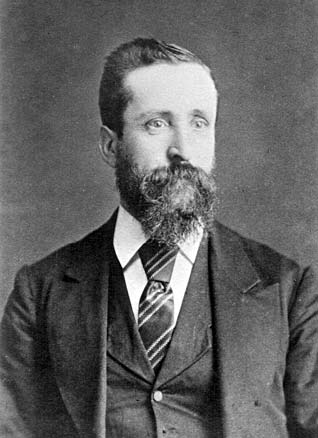 William Tidmarsh
William TidmarshBand Leader (and His Band)
 William Tidmarsh
William Tidmarsh
Band Leader (and His Band)
William Tidmarsh was born in Tetsworth, Oxfordshire, England on October 22, 1832. His parents were James and Elizabeth (Alder) Tidmarsh. William was the oldest of eleven children. He married Sarah Griffin in England on September 28, 1854. They had three children. Tidmarsh came to the United States in 1857 and was one of the early settlers of Wauconda, Lake County, Illinois; Sarah never came with him and died in England a few years later. William was a master blacksmith, following in the family business.
Tidmarsh married his second wife, Adelia Lyon, on July 23, 1859 in Wauconda. They had one child. Adelia died in 1861. Tidmarsh's third wife was Harriet A. Wells. They married on November 14, 1861 in Genoa, Wisconsin (after Tidmarsh signed on with the Fifty-First Illinois but before the regiment left Chicago for "the war"). They had three children. (William had one more child, born in 1864, with Adelia Lyon's sister, Sarah.)
Though Tidmarsh was a blacksmith by trade, he was also an extremely gifted musician.
The Band. Numerous communities across Illinois had their own local bands in the Nineteenth Century, before and after the Civil War. A Wikipedia source estimates that there were 10,000 community bands across the United States in the late 1880s. In the days before phonograph, radio, movies, television, world wide webs, and in smaller communities without orchestral ensembles, the local band was the primary source of musical entertainment. Bands ranged in size from 12 to 25 members. Tidmarsh was the leader of the band in the Wauconda area. The Waukegan Weekly Gazette of October 12, 1861 put the population of Wauconda at 111, not enough of a population base to support the membership of a band; the members were drawn not only from Wauconda but also from surrounding farms and communities. The Gazette reported on October 26, 1862, "All or nearly all of this band are residents of this County."
The October 12 Gazette reported that "Mr. William Tidmarsh of Wauconda is authorized to get up a Regimental Band of twenty-four pieces, for [the Fifty-First Illinois]." Tidmarsh was able to recruit twenty players. All twenty were signed up on the same day, October 5, 1861, in Wauconda, by William Tidmarsh. He himself was enrolled one day earlier by Colonel Gilbert Cumming. It's as if the Wauconda Band became the Fifty-First Illinois Band. The community supported the effort, partially funding instruments for the band members. W. B. Clark, one of Tidmarsh's players, stopped by the offices of the Gazette to show off his new saxhorn. "It is a beautiful B flat instrument of German Silver, and has a range of two and a half octaves. The price was $65, of which our citizens donated $30" (November 2, 1862). The band left Lake County on October 22 and traveled to Chicago "to join the Chicago Legion [51st Illinois], to which regiment it is to be attached during the continuance of the war."
Until February 14, 1862, the band along with the rest of the Fifty-First was at Camp Douglas, Chicago, recruiting, training, and outfitting. Tidmarsh lost two members of the band to desertion even before the regiment left for the field: Edgar Brooks deserted on November 20, 1861 and Charles Bell on February 12, 1862.
The regiment's first field assignments were at New Madrid and Island No. 10 as part of General John Pope's army. In April, 1862, the regiment along with the rest of Pope's army embarked on river steamers to travel to Fort Pillow, Tennessee. Army participation in the Fort Pillow mission was aborted in mid-April and the regiment with its band steamed back up the Mississippi on its way to Hamburg Landing, Tennessee. When the fleet tied up at Cairo, Illinois to take on coal, the men of the regiment visited the town and Tidmarsh lost two more members to desertion: William McClain and Frederick Brown never returned to the boat. From April 22 to May 30, the regiment was engaged in the move against Corinth, Mississippi, which was evacuated by Confederate forces at the end of May. In mid-May a deputation of Chicago citizens came to Farmington, Mississippi where the regiment was camped and presented the regiment with its first set of colors. The ceremonies were elaborate and the band played its part. But, the band—along with most other Federal regimental bands—was not long for the world. As a cost-saving measure regimental bands were mustered out and sent home. The Fifty-First's regimental band was formally mustered out of the service on June 30, 1862 at Corinth, Mississippi. The government paid transportation home for the band members. The Waukegan Weekly Gazette reported the return of the band. "Last evening they gave our citizens a musical treat from the steps of the Court House. It is not too much to say that they were one of the finet bands in the army. We understand that they intend giving a few Concerts through the county, under their able leader, Mr. Tidmarsh, for the purpose of raising money to replace instruments lost [by other regiments] at the battle of Pittsburg Landing" (July 12, 1862).
The decision to muster the bands out was a hasty one—and certainly not a unanimous one at the highest reaches of military administration. Quartermaster-General of the Federal army M. C Meigs wrote a few months after the regimental bands were disbanded, "A great mistake was made when the bands were abolished. These bands were of value to the soldier in camp, in bivouac, on the march, and they gave a trained, enlisted, disciplined, officered body of men to each regiment, whose duty during and after an action it was to take care of the wounded—a true ambulance corps, regularly enlisted and capable also of doing something else when not engaged with the wounded. From a mistaken notion of economy they were disbanded, and now comes up a cry for a special ambulance corps to be enlisted, officered, and paid to do nothing else but attend to the wounded. This will cost more than the unfortunately discarded bands. And was their ability to make music an objection? Would they be less efficient in action that they had, when not needed to carry stretchers and bear off the wounded, regaled their comrades with sweet sounds?" (Meigs to Henry I. Bowditch, October 30, 1862, The War of the Rebellion: A Compilation of the Official Records of the Union and Confederate Armies, Series III, Volume 2, p. 701.)
With the Eighth Illinois Cavalry. Tidmarsh's Civil War military career was not over when the Fifty-First Illinois band went home. In the Autumn of 1864 William again volunteered for military service. He was assigned to the Eighth Illinois Cavalry and enrolled, at age 31, on October 10, 1864 in Company A of that regiment. Though Tidmarsh was formally a private of Company A, he spent almost his entire cavalry career on detached service as bandmaster at headquarters of the brigade of which the Eighth Illinois Cavalry was a part. He served until the regiment was mustered out in July 1865.
After the War. The 1870 census finds William and Harriet living in Wauconda with their two surviving children. William and Harriet divorced on October 14, 1882. William married his fourth wife, Allie, in 1908, in Chicago's Hyde Park. William was no ordinary musician. He could play and write music for several instruments, but his favorites were the violin, cornet and organ. After Lincoln's assassination, Tidmarsh was also chosen to lead one of the bands for the funeral procession through Chicago.
Tidmarsh died in Waukegan, Lake County, Illinois on September 23, 1920. He was buried in Wauconda Cemetery. His gravestone has been broken up or stolen.
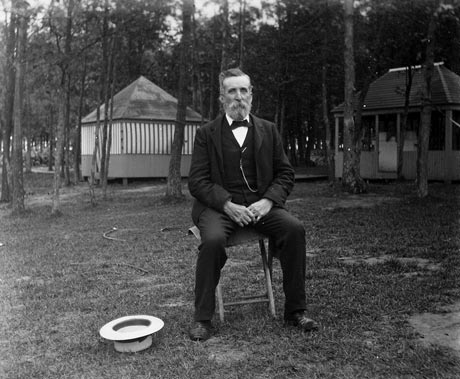 |
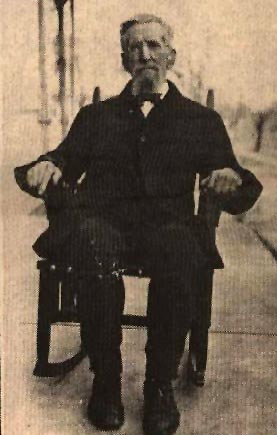 |
The picture at left shows William at Camp Thomas on Bangs Lake, Lake County, Illinois. The camp was at times used as a military staging location. The picture at right shows William, growing old, in a photo from a local newspaper article about early settlers in Wauconda. |
Members of the Band. As mentioned above, the band members like its leader were drawn from the Wauconda community. Some of them lived out their post-war lives in Wauconda and are buried there or in nearby community cemeteries. The graves of bandmembers Reuben Hill and Solomon Smith are shown here. They are both buried in the Wauconda Cemetery.
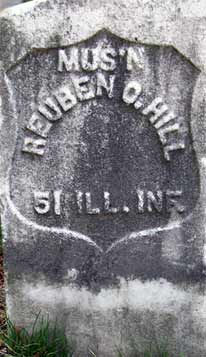 |
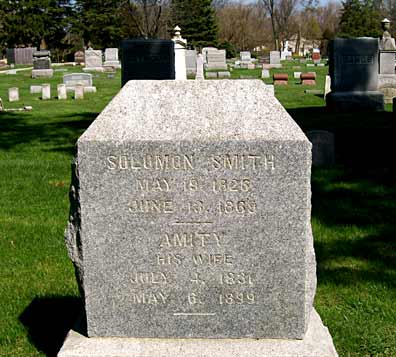 |
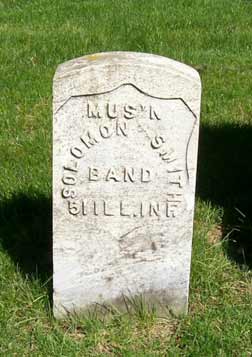 |
Solomon Smith was born on May 19, 1826 in New York. The 1860 census shows Solomon living in Lake County Illinois, earning his living as a farmer, with his wife Amity and four children. He enrolled for band duty with the Fifty-First Illinois on October 5, 1861, when William Tidmarsh signed on all the band members from Wauconda. Solomon fell ill sometime after the New Madrid/Island No. 10 campaign and was home on sick furlough by mid-April, 1862. When the band was about to be mustered out, Smith had to travel to Corinth, Mississippi to finalize his muster-out in June, 1862. Solomon died on June 13, 1869.
Reuben Hill was born on September 11, 1838 in New York. Reuben was grandson and namesake of the only Revolutionary War veteran to live and be buried in Wauconda. Reuben's parents were Seth Morris and Deborah (Clark) Hill. The 1860 census lists Reuben in Wauconda, living with his parents. His occupation was given as carpenter. He married Mary Darling in October, 1860, just a year before his short career with the Fifty-First began. He signed on with the regimental band at the same time Solomon Smith and the others did; and, his career ended with the band's demise on June 30, 1862. The 1870 census shows him earning his living as a butcher, the 1880 census as a farmer, the 1900 census with no occupation listed, the 1910 census similarly. He died on October 2, 1911.
Sources:
William Tidmarsh, Compiled Service Record, Records of the Adjutant General's Office, 1780's-1917, Record Group 94, National Archives and Records Administration, Washington, D.C.
Tidmarsh photographs and biographical information courtesy of Susan Rojas, a Tidmarsh family genealogist, Crazycandles83@yahoo.com. All rights reserved.
Photographs of Hill and Smith graves, and information relative to them, courtesy of Priscilla Ross-Fox of Lake County, Illinois; all rights reserved. Use allowed only with express permission of Ms. Ross-Fox.
United States Census.